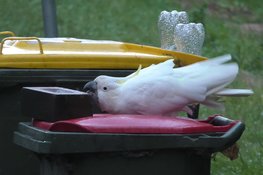Cognitive and Cultural Ecology
Traditional views of Darwinian evolution focus on selection acting on genetically underpinned variation as a means of adaptation. However this may neglect the potential contribution of the over-generation transmission of information (cultural inheritance) as a source of locally adaptive behaviour – this might be particularly important in long-lived species and when facing novel or changing environments. For example, the capacity for innovation, social learning and culture is thought to be vitally important in the success of humans as a species, facilitating our colonization of almost every terrestrial habitat on Earth. But do other animals also have culture? Is social learning and the cultural inheritance of behaviour important to the ecology of any other species? How are the form and patterning of traditions determined by cognition or intelligence, and by social systems?
Our research group works at the intersection between behavioural ecology and animal cognition, and borrows methods from social network theory and comparative psychology. Broadly, we study social information use, with a particular focus in the interaction between individual cognition, social dynamics and socially learning. We ask questions like: do transmission biases promote or mitigate against the spread of information at the population level? How do individual behaviour and social relationships influence information transmission pathways? What is the relationship between demographics, social structure, and cultural evolution? Our empirical work involves both laboratory experiments and wild field studies in birds; we work at field sites in Germany and in Australia, and utilise state-of-the-art automated tracking technologies and analytical techniques.
Ongoing Projects
My previous research has revealed that great tits can learn the solution to novel foraging puzzles by observing others, and transmit these behaviours through social networks to form new traditions that persist over generations.
Our current research builds on these findings, using tits as a model system to explore cultural evolution in animals. We ask questions like: what selective processes operate on information transmission and retention? How do the form and frequency of cultural traits interact with population demographics?
Sulphur-crested cockatoos are a highly social, cognitive complex species that are also successful urban invaders, showing a range of innovative behaviours that facilitate city living. This project studies the cognitive ecology of a marked population of cockatoos in collaboration with Dr. John Martin (Royal Botanic Gardens, Sydney), and Dr. Richard Major (the Australian Museum). We have two aims: first, to characterise vocalisations and learnt foraging behaviour within and between subpopulations, and second, to investigate potential social-cognitive mechanisms promoting urban invasion and adaptation.
In Australia, cockatoos and humans are in an arms race over garbage access
more
Bigger brains have led some species of parrot to live surprisingly long lives, new research shows
more
Study suggest that crows have some concept of the relative 'value' of different tool types
more
World-first research proves ‘cockies’ learn unique bin-opening behavior by copying others
more
Immigration helps populations shift to more efficient behaviors
more
Birds are just as fashion-conscious as people
more
Tierischer Jahresrückblick: Wütende Kraken, tanzende Ratten und springende Spinnen
more
Humans and parrots battle in an ‘arms race’ over trash in Australia
more
Show more










